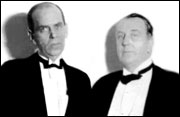

by Jerry Floyd
 |
|
|
Palm Beach Historical Society Wilson and Addison Mizner
|
Then a railroad embargo on building materials halted construction in Florida and a ship carrying construction materials blocked the access to Miami's harbor for six weeks. This combination of events ruined the Mizners, whose downfall presaged the collapse of the Land Boom, in early 1926.
Hollywood
The 1926 collapse of the Mizner Development Corporation in Boca Raton caused all sorts of legal problems for Addison and Wilson Mizner. Addison took personal responsibility for the corporation's debts. From 1933, until his death in 1933, Addison was nearly destitute, relying on loans from wealthy pals, and an occasional architecture commission thrown his way.
Wilson deserted Florida in 1927 and drove to Hollywood. For yet another time, Wilson landed in a boomtown, as the change from silent to talking pictures turned Hollywood into the world's film capital. Wilson's wit, his colorful past, and his knowledge of underworld slang (acquired during his stay in New York) made him a Hollywood natural.
Backed by movie mogul Jack Warner and actress Gloria Swanson (or possibly by one of Swanson's former husbands), Wilson opened the Brown Derby restaurant, a hangout for moviedom's most glamorous names. Wilson regularly held court from one of the Brown Derby's booths, where his coterie included writer Anita Loos, who described Wilson as "America's most fascinating outlaw". Best known for writing "Gentlemen Prefer Blondes", Loos also wrote the script for the film "San Francisco". Loos reportedly based the film's leading character in the movie "San Francisco" on Wilson (Clark Gable portrayed this film character).
Another Brown Derby habitue: Irving Berlin, a chum of Wilson's during the Mizners' sojourns in New York and Palm Beach. Once, Wilson had to be physically restrained after attacking a Brown Derby patron who Wilson thought had insulted Berlin. (Such episodes no doubt aggravated Wilson's steadily worsening heart condition.) When not hanging out at the Brown Derby, Wilson was most often on the Warner Brothers lot, where he was hired as a scriptwriter. Though touted for his screenplay for "One Way Passage," an early talkie hit, most of Wilson's time at Warner Brothers was spent loafing.
Occasionally, friends from Wilson's earlier years would show up at Warner Brothers. In New York, Wilson managed a middleweight fighter, Stanley Ketchel, who lasted 12 rounds against heavyweight Jack Johnson. Two decades later, Johnson was hired for a bit part in a Warner Brothers movie. Wilson took the former boxer around the lot, introducing him to the top brass at Warner Brothers.
The ever-cynical Wilson characterized his Hollywood years as "a trip through a sewer in a glassbottomed boat." Wilson had taken a few such trips. This time there was a difference: Addison Mizner was no longer a co-passenger.
“Assassins is about how society interprets the American Dream, marginalizes outsiders and rewrites and sanitizes its collective history. "Something Just Broke" is a major distraction and plays like an afterthought, shoe horned simply to appease. The song breaks the dramatic fluidity and obstructs the overall pacing and climactic arc which derails the very intent and momentum that makes this work so compelling...”
- Mark Bakalor
“I found [the Sondheim Celebration's Company] to be completely delightful. Almost all of the numbers excited and energized me, and most of the scenes were about as pitch-perfect as you can get. I just sat there with a big smile on my face the whole show.
Which is not to say that it is perfect...”
- popcornonmyknees
Explore the rest of the Finishing the Chat Community Forum
|
|
CD: $13.99
DVD: $25.49
VHS: $19.98
|
|
Browse additional merchandise...